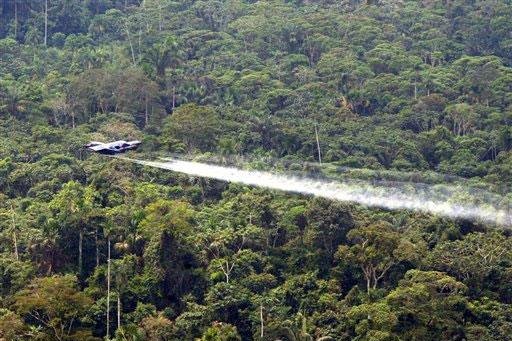Colombia's legislature announced it will phase-out its policy of defoliation by aerial spraying, to eradicate the coca plant, the raw material of cocaine. Photo courtesy of U.S. State Department.
BOGOTA, May 15 (UPI) -- Colombia's legislature announced a phase-out its policy of defoliation by aerial spraying, to eradicate the coca plant, the raw material of cocaine.
The action will be phased out, the state drug policy agency said Thursday, because the World Health Organization has said glyphosate, an element of the herbicide used to spray the crops and kill them, could be carcinogenic to humans. Aerial spraying of coca fields has been the preferred method of eradication by United States drug officials, who have found enthusiastic cooperation from their Colombian counterparts for the past two decades.
Detractors have also noted aerial spraying is less efficient than the time- and labor-consuming practice of gathering or poisoning the plants by hand, and crop-dusting planes need to be protected from rebel groups in Colombia who profit from the crop. Others, like a European Union task force and the German Federal Institute for Risk Assessment, have studied glyphosate, which is a part of the recipe for the lawn care weed killer "Roundup," and pronounced it non-cancer-forming.
The United Nations Office on Drugs and Crime reported coca cultivation in Colombia decreased by over two-thirds from 2000 to 2013, an era of robust aerial spraying, through government eradication programs and encouragement of farmers to plant other crops. However, land used to grow coca increased by 39 percent in 2014 alone, U.S. officials noted.
The differing views of Colombia and the United States over aerial spraying, which in Colombia is largely conducted by U.S. contractors, denote a change in the two countries' relationship.
"The folks who run counternarcotics never want to give up any of their tools, and there are pockets of discontent inside the U.S. government with this decision," Adam Isacson of the research group Washington Office on Latin America told the New York Times. "Colombia and the United States have been in lock step on a hardline approach. It's the first time there's been light between the two countries on what the strategy should be, in recent memory."
Among the alternatives to aerial spraying is the controlled introduction of a moth, native to the area, which lays eggs in coca plants; the emerging caterpillars devour the leaves of the plants. Plans to use the Leoria noyesi moth have been criticized because their concentrated emergence could harm other growing plants.















